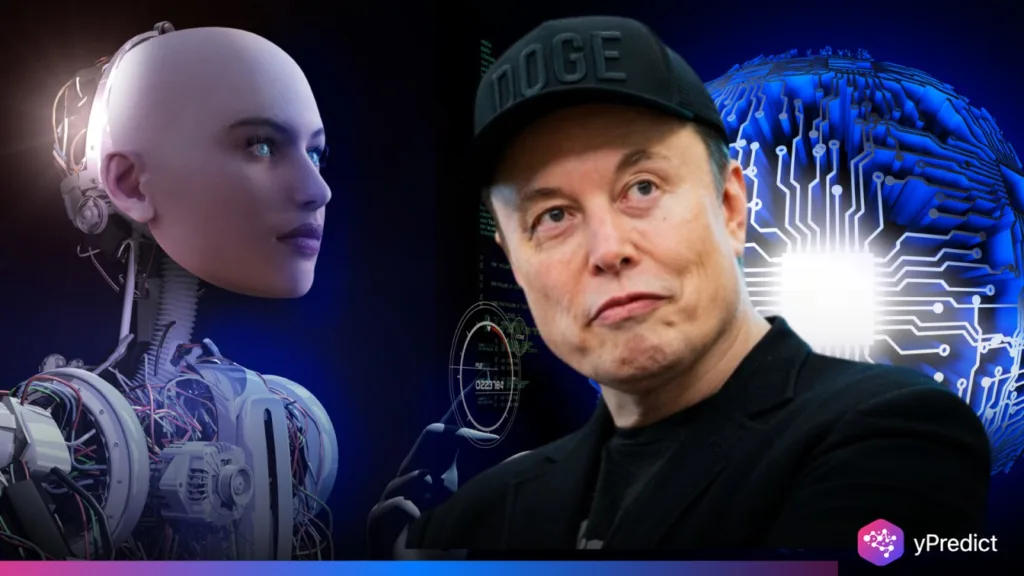
Musk’s new prediction rattles AI observers. According to Tesla CEO, machines will outsmart individual humans by 2026. Even bolder – AI could surpass collective human intelligence by 2030. They compress decades of anticipated AI progress into mere years. The billionaire’s crystal ball record remains mixed. He once predicted we’d be on Mars by 2024. His AI predictions have changed in the past as well. In 2020, Musk said AI could supercede humans by 2025. Now he’s nudged that date up a bit. Recent AI advances warrant a bit of optimism. Google produces 25% of new code with AI tools Meta readies multimodal AI models that handle text and images jointly Intel’s Gaudi 3 chip trains AI 1.7X faster than Nvidia These innovations point to compounding potential.
Racing Toward Artificial General Intelligence
Professional beliefs range wildly on AI schedules. Asian researchers expect human-level AI in 30 years on average North American scientists say 74 years. Musk 2026 prediction lies well in front of most projections. Anthropic’s Dario Amodei also forecasts AGI in 2026. Eric Schmidt thinks AI will reach general intelligence in 3 to 5 years The trick is in figuring what ‘smarter than humans’ means. Today’s AI is fantastic at pattern matching and number crunching. But duplicating human creativity, intuition, and emotional intelligence, on the other hand, continues to be challenging. AI agents can be used to book flights and offer customer support. They flail at anything requiring deep logic in a variety of fields. Jensen Huang says AI will perform at human level on every test by 2029
Meta’s upcoming Llama 3 shows how fast it’s all happening. The model merges text and image understanding for richer interactions. Intel’s Gaudi 3 chip trains models 50% quicker than Nvidia H200 in certain instances. These hardware breakthroughs speed up AI timelines. Leopold Aschenbrenner cautions us against sprinting to risky skills too fast. The definition problem matters enormously. Modern AI models score 130+ IQ They lecture in twenty languages and code in most programming languages. Others contend we’re already cavorting with proto-AGI. The question is, does scaling today’s architectures achieve genuine general intelligence.
Enterprise AI Transformation Accelerates
Deloitte forecasts 25% of companies to implement AI agents in 2025 That figure jumps to 50% by 2027. These programs accomplish things without much human supervision. Initial uses center around knowledge work and workflow automation. Corporations shell out top dollar for AI-powered gadgets and offerings. Smartphone makers double down on AI features. GenAI-enabled phones will account for 30% of shipments by 2025. PCs with local AI processing reach 50% of shipments. This hardware revolution makes more advanced applications possible. Tesla aims to build as many as 100,000 Optimus robots by 2026. Musk says robots might be 80% of Tesla’s future worth
3 important AI trends across industries Agentic AI autonomously completes complex tasks. Physical AI is embedded into robots and manufacturing. Sovereign AI serves national security and geopolitical interests. Each of which represents alternative routes to superintelligent systems. The enterprise adoption time frame, however, is more in line with Musk’s forecasts. If AI agents explode in enterprise, the jump to general intelligence gets more likely. Corporations pumping billions into AI infrastructure generate feedback loops that speed things along. Sam Altman predicts AI agents will reshape workforces by 2027. But challenges remain substantial. And current AI is not very good at reasoning across domains. They flub hard multi-step situations and they falter with new experiences. The divide between narrow AI and general intelligence could turn out to be bigger than hopefuls anticipate.
Preparing for an Uncertain Future
Musk admits 20% chance of AI annihilating mankind. He keeps 80% probabilities of good news. This risk calculus motivates his neural lace vision—brain-computer interfaces that bridge human and AI. His xAI company builds “maximally truthful” AI. The timeline compression generates urgency around AI safety and regulation. If Musk’s guesses are right, then humanity has little time to brace for superintelligent systems. Existing AI governance systems could be insufficient to handle this level of acceleration. International cooperation becomes imperative to avert disaster.






